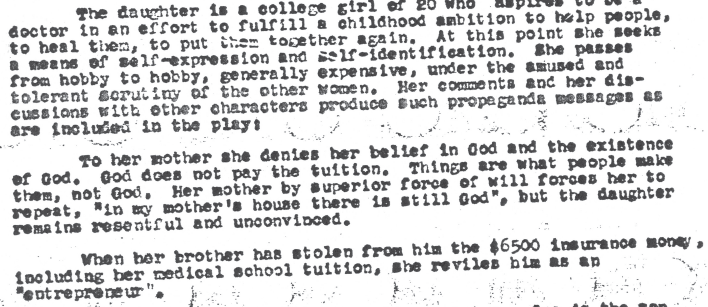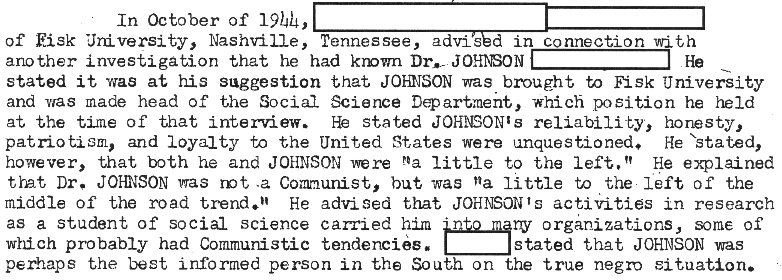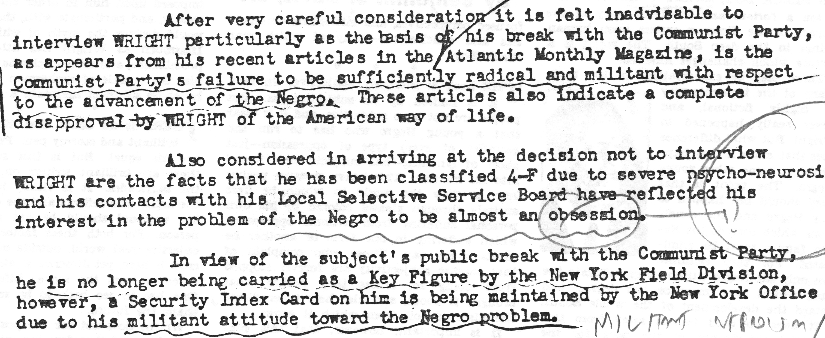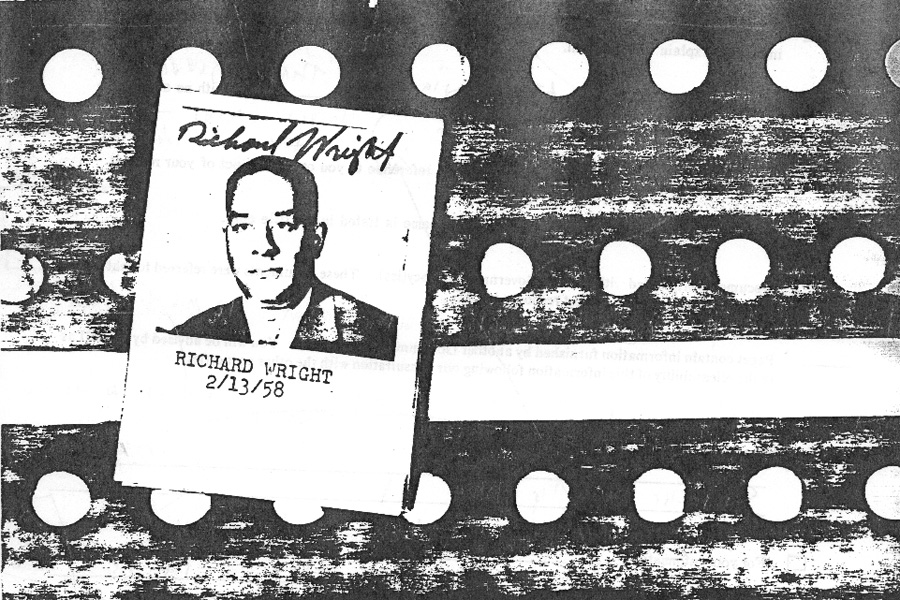William Maxwell, a professor at Washington University and an expert in African-American literature, filed 106 FOIA requests in the process of writing his new book FB Eyes: How J Edgar Hoover’s Ghostreaders Framed African American Literature. (The title is a reference to a Richard Wright poem.) He collected the results, tens of thousands of pages of surveillance of some of the 20th century's greatest novelists and sociologists, on a companion page.
Caught up in Hoover's web of paranoia were some legendary Chicago writers—Richard Wright, Lorraine Hansberry, St. Clair Drake, Charles S. Johnson ("With some irony, his grandson, Jeh Johnson, was named the U.S. Secretary of Homeland Security in 2013"), and E. Franklin Frazier.
What's striking about it, beyond its existence at all, is the laborious, grinding bureaucratic pointlessness of it all, tens of thousands of pages to learn that writers thought… what they were writing, pretty much. Which never, ever seems to sink in.
The most poignant passage I came across was written by some functionary who was dispatched to take in a live performance of A Raisin in the Sun to look for possible subversive propaganda.

The play contains no comments of any nature about Communism as such but deals essentially with negro aspirations, the problems inherent in their efforts to advance themselves, and varied attempts at arriving at solutions. The contrasting proposals for solutions are set up through the character delineations of the widowed mother, her son, and her daughter. The specific bone of contention which is the central theme of the plot is the sum of $10,000 received by the widow as a result of the death of her late husband.
Not Communism "as such," but the anonymous anti-Marxist critic goes digging for "propaganda," with all the enthusiasm of a freshman in American Lit 101 writing a paper an hour before class.

The daughter is a college girl of 20 who aspires to be a doctor in an effort to fulfill a childhood ambition to help people, to heal them, to put them together again. At this point she seeks a means of self-expression and self-identification. She passes from hobby to hobby, generally expensive, under the amused and tolerant scrutiny of the other women. Her comments and her discussions with other characters produce such propaganda messages as are included in the play:
To her mother she denies her belief in God and the existence of God. God does not pay the tuition. Things are what people make them, not God. Her mother by superior force of will forces her to repeat, "in my mother's house there is still God", but the daughter remains resentful and unconvinced.
When her brother has stolen from him the $6500 insurance money, including her medical school tuition, she reviles him as an "entrepreneur."
Snooping on the theater patrons revealed them to be thoroughgoing theater patrons.

From the writer's observations of the plot and the dialogue, nothing specific was found that is peculiar to a CP program. Audience reaction varied considerably to different scenes and lines. The quality of some of the acting was applauded, some of the lines drew applause primarily on a racial basis, others appeared to be applauded not only by negroes in the audience but by a substantial number of whites. The play was well attended. Comments overheard from whites appeared to indicate that they appreciated the drama and the quality of the acting, especially on the part of CLAUDIA McNEIL who handled the part of the mother. Relatively few appeared to dwell on the propaganda messages.
The FBI went to Fisk University to check up on Charles S. Johnson, the University of Chicago Ph.D. whose The Negro in Chicago is a landmark work of sociology; about the worst they could find was how he paid off his credit: "slow but satisfactory."

In October of 1944, __________ of Fisk University, Nashville, Tennessee, advised in connection with another investigation that he had known Dr. JOHNSON _______. He stated it was at his suggestion that JOHNSON was brought to Fisk University and was made head of the Social Science Department, which position he held at the time of the interview. He stated JOHNSON's reliability, honesty, patriotism, and loyalty to the United States were unquestioned. He stated, however, that both he and JOHNSON were "a little to the left." He explained that Dr. JOHNSON was not a Communist, but was "a little to the left of the middle of the road trend." He advised that JOHNSON's activities in research as a student of social science carried him into many organizations, some of which probably had Communistic tendencies. ____ stated that JOHNSON was perhaps the best informed person in the South on the true negro situation.
The author of Native Son was found to have "almost an obsession" with "the problem of the Negro."

After very careful consideration it is felt inadvisable to interview WRIGHT particularly as the basis of his break with the Communist Party, as appears from his recent articles in the Atlantic Monthly Magazine, is the Communist Party's failure to be sufficiently radical and militant with respect to the advancement of the Negro. These articles also indicate a complete disapproval by WRIGHT of the American way of life.
Also considered in arriving at the decision not to interview WRIGHT are the facts that he has been classified 4-F due to severe psycho-neurosis and his contacts with his Local Selective Service Board have reflected his interest in the problem of the Negro to be almost an obsession.
In view of the subject's public break with the Communist Party, he is no longer being carried as a Key Figure by the New York Field Division, however, a Security Index Card on him is being maintained by the New York Office due to his militant attitude toward the Negro problem.
Despite Richard Wright's status as a respected author, the government that was closely monitoring his whereabouts, contacts, and ideological evolution—not to mention his peers—found him to be curiously ungrateful to his country.

It appeared from Subject's contacts with his Local Board that his interest in the problem of the Negro has become almost an obsession and it was said that he apparently overlooks the fact that his own rise to success refutes many of his own statements regarding the impossibility of the Negro's improving his personal position.
The FBI proved to be thorough literary critics with tremendous resources, but ultimately failed the comprehension part of the exam.




